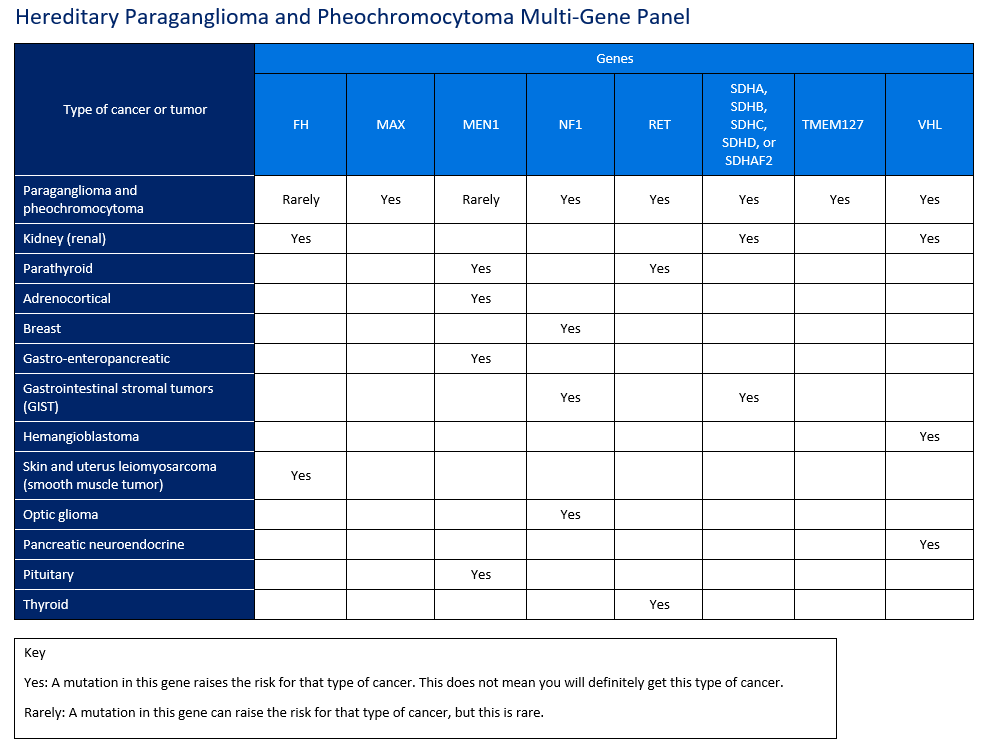This information explains the multi-gene panel test for hereditary paragangliomas and pheochromocytomas. It also explains how your results may affect you and your family.
In this resource, the word “family” means people related to you by blood. They’re not related to you through marriage or adoption. We also call these family members your blood relatives.
This multi-gene panel test is done to check your DNA for gene mutations linked to hereditary paragangliomas (rare tumors that form in the nerves in the head and neck) and pheochromocytomas (rare tumors that form in the adrenal glands). Normally, these genes help prevent cancer. A mutation in these genes causes them to stop working like they should. This raises your risk for some types of cancers.
For more information, read Frequently Asked Questions About Hereditary Cancers.
What is a multi-gene panel test?
We can test for mutations 1 gene at a time or many genes at the same time. A multi-gene panel test is when we test many genes at once using the same saliva or blood sample. By testing many genes at once, it may be possible to find a hereditary cause of cancer more quickly.
What genes will be tested on my multi-gene panel?
Click on the table to make it bigger. The table’s left column shows the cancers you may have a higher risk for if you have a mutation. The other columns show the genes this multi-gene panel test usually includes.
Not everyone has the same genes included in their multi-gene panel tests. The decision about which genes your multi-gene panel test includes may depend on several things, including your personal and family history. Your genetic testing consent form will have a list of the genes in your multi-gene panel test.
It’s important to know that the risk isn’t the same for all cancers listed. That means the risk for some cancers increases more than the risk for other cancers.
What happens if I have a mutation?
Your genetic counselor will review your results. They will talk with you about what cancer your mutation is linked to. As we research these mutations, we may learn they raise the risk for other types of cancers.
Your genetic counselor will also review your personal and family history of cancer and give you cancer screening recommendations. They may recommend you start having cancer screenings at a younger age or have them more often than most people. They may also suggest you get specialized screenings to help find cancer as early as possible.
Some examples of these cancer screenings include:
- Computerized tomography (CT) or magnetic resonance imaging (MRI) scans.
- Visiting a dermatologist (skin doctor) to have your skin checked for signs of cancer.
- Specialized blood tests.
Depending on which gene mutation(s) you have, your genetic counselor may also talk with you about having surgery to try to keep cancer from developing. For example, they may recommend:
- Surgery to remove your thyroid to prevent thyroid cancer.
- Surgery to remove the uterus to prevent uterine cancer.
If you decide to have surgery, talk with your genetic counselor about the right time to have it. Surgery to remove the uterus affects fertility (your ability to have biological children). If you plan to have biological children, your genetic counselor can talk with you about your options.
What happens if I do not have a mutation?
If you do not have a mutation or if we find a variant of uncertain significance (VUS), your genetic counselor will review your personal and family history of cancer. They’ll talk with you about the general cancer screening guidelines you should follow.
A VUS is a change in a gene, but we don’t yet know if it is linked with a higher risk for cancer. Most VUS are eventually found to be normal changes that do not affect your health.
What does a gene mutation mean for my blood relatives?
Most of the mutations we test for are passed down in a dominant pattern. This means you only need to inherit the mutation from 1 parent to have a higher risk for cancer. Males and females have an equal chance of passing down a mutation in their family.
If you have a mutation in 1 of these genes, it’s possible that other blood relatives have it too. There’s a 50% chance your biological parents, siblings, and children also have the same mutation.
Your distant family members may also be at risk for having the same mutation. It may be helpful to share this information with them. This includes aunts, uncles, nieces, nephews, and cousins.
Your genetic counselor will review your family history and talk with you about whether they recommend genetic testing for your blood relatives.
